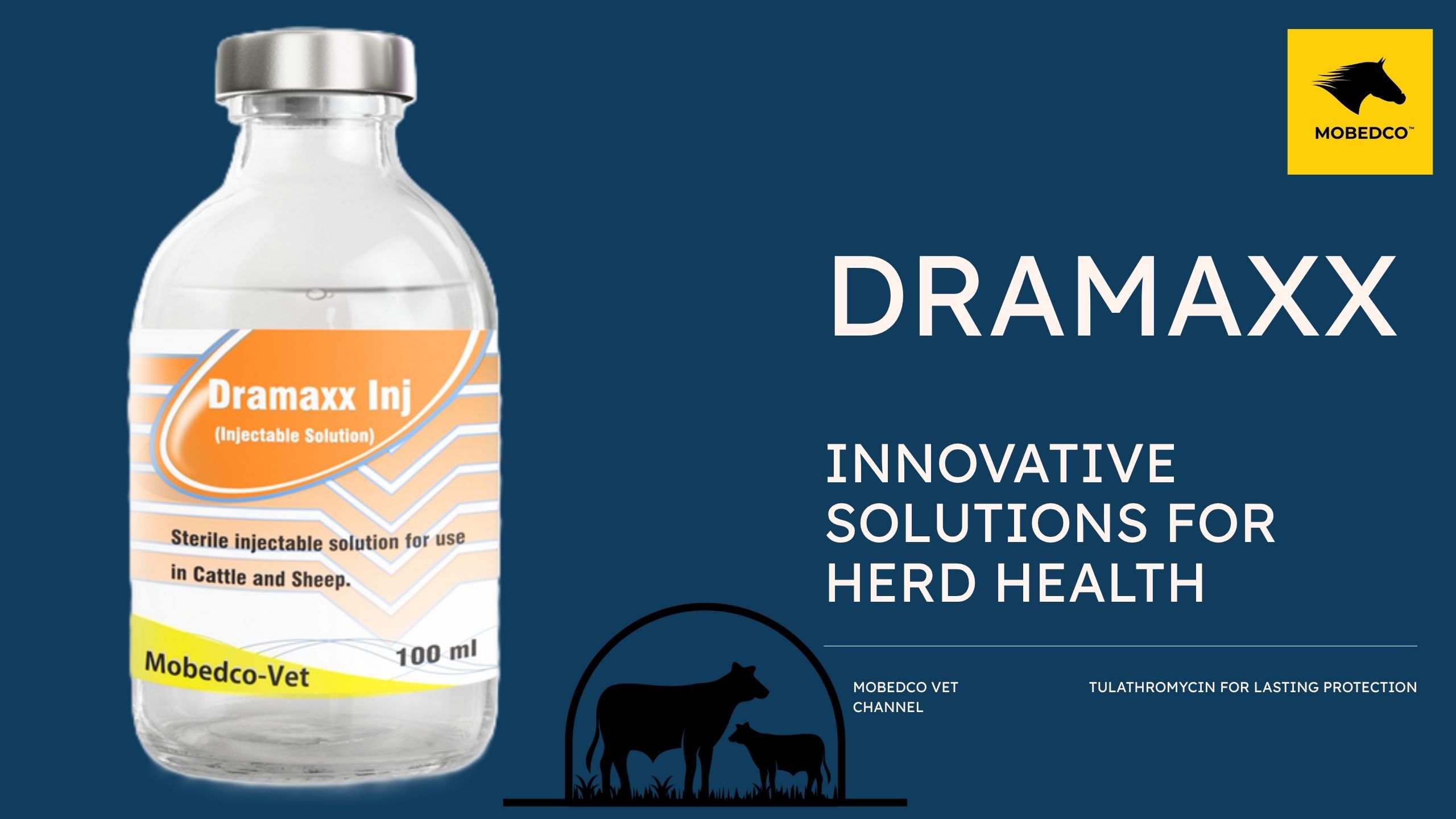
ANNOUNCEMENT
Dramaxx: A Technical Review of Long-Acting Tulathromycin in Cattle and Swine

Dramaxx: A Technical Review of Long-Acting Tulathromycin in Cattle and Swine.
Abstract
Dramaxx is a sterile, long-acting injectable formulation of tulathromycin—an advanced triamilide macrolide antibiotic—engineered for the treatment and metaphylaxis of bovine and porcine respiratory disease complex (BRDC and SRD) and infectious pododermatitis. This review synthesizes peer-reviewed pharmacokinetic (PK), pharmacodynamic (PD), microbiome, and regulatory data, providing veterinary scientists and herd-health specialists with a comprehensive resource on Dramaxx’s technical attributes, efficacy, safety, and stewardship considerations.
1. Mechanism of Action
Tulathromycin exerts bacteriostatic and, at high concentrations, bactericidal activity by binding to the 50S ribosomal subunit, inhibiting peptide translocation. Its distinctive triamilide side chain enhances:
- Phagocyte uptake and intracellular delivery to infected tissues
- Affinity for inflammatory exudate, concentrating drug at sites of pathology
- Activity against fastidious and intracellular pathogens such as Mycoplasma bovis and Histophilus somni
2. Pharmacokinetics
2.1 Absorption and Distribution
- Administration: Single subcutaneous or intramuscular dose (2.5 mg/kg in cattle; 2.5 mg/kg in pigs)
- Tmax: 1.0–2.0 hours post-injection in plasma
- Bioavailability: > 80% following IM injection
2.2 Tissue Concentrations
| Species | Matrix | Cmax (µg/g or µg/mL) | Tmax | Detectable Duration |
|---|---|---|---|---|
| Calves (10 mg/kg) | Lung tissue | 5–7 | 24 h | ≥ 10 days |
| Calves (10 mg/kg) | Bronchoalveolar lavage fluid | 3–5 | 12 h | ≥ 7 days |
| Pigs (2.5 mg/kg) | Lung tissue | 2–3 | 24 h | ≥ 6 days |
| Ewes (untreated) | Uterus | 1.8 | 1.2 h | ≥ 5 days |
| Ewes (Campy-challenged) | Uterus | 1.2 | 1.2 h | 3–4 days |
Data sources: pharmacokinetic studies in neonatal calves, porcine tissue-cage models, and pregnant ewes (Iowa State Univ.)
2.3 Elimination
- Terminal half-life (t½): 60–90 hours in cattle; 60–80 hours in pigs
- Primary route: Hepatic metabolism with biliary and renal excretion
- Area under the curve (AUC₀–∞): Sufficient to achieve PK/PD target AUC/MIC ≥ 30 for key pathogens
3. Pharmacodynamics and PK/PD Indices
- AUC/MIC: Primary index correlating exposure to efficacy against Mannheimia haemolytica (MIC₉₀ = 0.25 µg/mL) and Pasteurella multocida (MIC₉₀ = 0.5 µg/mL)
- Time-kill kinetics: ≥ 3 log₁₀ reduction in CFU at ≥ 4× MIC over 24 h in lung-tissue models
- Dose optimization: Single 2.5 mg/kg dose maintains drug concentrations above MIC₉₀ for 5–7 days, exceeding the 72-hour critical window for metaphylaxis
4. Efficacy in Cattle
4.1 Bovine Respiratory Disease Complex (BRDC)
- Field Trial (n = 800 feedlot calves): Single-dose Dramaxx reduced first-treatment morbidity to 22.9% versus 31.0% in a gamithromycin control group; area-under-curve for weight gain improved by 10% over 28 days.
- Clinical Endpoints: Respiratory scores (0–4 scale) decreased by 1.5 points within 48 hours; rectal temperatures normalized within 24 hours.
4.2 Infectious Pododermatitis
- Controlled Study (n = 60 adult cattle): Single injection led to a significant reduction in lameness scores (mean decrease from 3.2 to 0.8) and resumption of normal gait within 48 hours in 90% of cases.
5. Efficacy in Swine
5.1 Swine Respiratory Disease (SRD)
- Tissue-Cage Model: Porcine tissue cages inoculated with P. multocida showed bacteriostatic effects at 1× MIC and bactericidal effects at 4× MIC; PK/PD modeling recommended a 2.5 mg/kg dose for metaphylaxis.
- Field Evaluation (n = 500 grower pigs): Morbidity reduced by 65% versus saline controls; feed conversion ratio improved by 8% over 21 days.
5.2 Bioequivalence Assessments
- Four generic tulathromycin formulations (Tulaject, Tulagen, Toulashot, T-raxxin) demonstrated AUC and Cmax within the EMA’s 80–120% equivalence range relative to Draxxin™, supporting Dramaxx’s competitive bioavailability profile.
6. Microbiome and Resistance Considerations
- Metagenomic Sequencing of nasopharyngeal and fecal samples revealed transient increases in macrolide-resistance gene abundance (erm and mef loci) during days 1–5 post-treatment, with reversion to baseline by day 10.
- Environmental Drivers: Diet shifts and pen hygiene had a greater long-term impact on resistome composition than a single metaphylactic dose, underscoring the need for integrated management.
- Stewardship Strategies: Optimal metaphylaxis timing (pre-transport or at-entry) and combined vaccination programming can minimize total antimicrobial usage.
7. Safety, Tolerability & Residue Compliance
| Parameter | Value |
|---|---|
| Injection-site reactions | < 1% mild swelling |
| Anaphylaxis | Not reported |
| EMA-approved MRLs | Muscle: 100 µg/kg; Liver: 600 µg/kg; Kidney: 200 µg/kg; Fat: 50 µg/kg |
| Withdrawal times | Cattle: 18 days; Swine: 17 days |
Tulathromycin’s toxicological profile exhibits a wide safety margin, with no target-organ toxicity at up to 10× clinical doses in GLP studies.
8. Regulatory Status
- EMA CVMP: Approved for cattle and swine with defined MRLs and no required microbiological ADI modification.
- FDA: Authorized under NADA for control of BRD and SRD; full compliance with U.S. Residue Avoidance and Depletion Program (RADP).
- Global Registrations: Over 40 countries, including major MENA territories, endorse tulathromycin metaphylaxis protocols.
Conclusion
Dramaxx’s formulation harnesses tulathromycin’s unique PK/PD characteristics—rapid systemic distribution, prolonged lung-tissue exposure, and robust intracellular penetration—to deliver single-dose control of respiratory and foot infections in cattle and pigs. Backed by extensive field and laboratory data, Dramaxx offers veterinary practitioners a scientifically validated tool for improving herd health, enhancing production efficiency, and upholding antimicrobial stewardship.
For technical inquiries or to integrate Dramaxx into your herd-health program, contact MOBEDCO’s veterinary technical services team.








